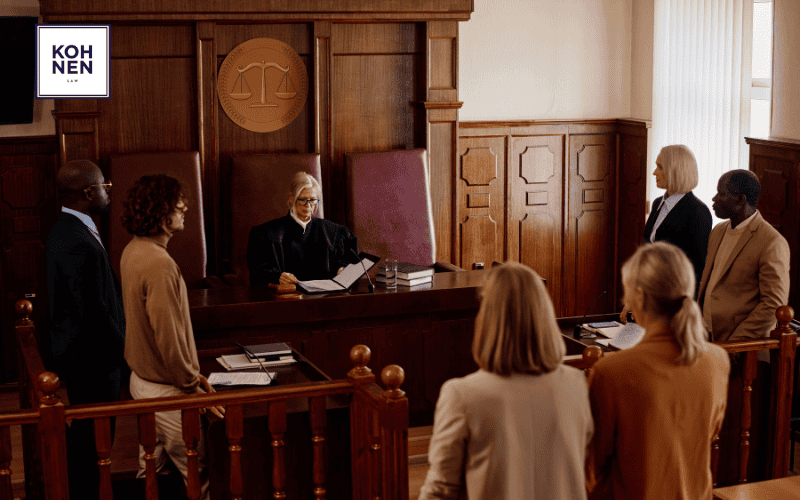
As someone who’s been a criminal defense attorney in San Diego for many years, I know that getting arrested is a frightening experience. But the truth is, how you handle those crucial first moments can make all the difference in the outcome of your case. Whether you’re dealing with a misunderstanding or facing serious charges, the steps you take immediately following your arrest can protect your rights and even your freedom.
In this guide, I’ll walk you through exactly what to do if you’re arrested in San Diego, from protecting your rights to contacting the right lawyer.
When you’re arrested, your first instinct may be to argue, fight, or even run. I get it—emotions are high, and you’re likely confused. But trust me when I say that resisting or causing a scene will only make things worse.
Just because you’re cooperating doesn’t mean you’re admitting guilt. It simply means you’re taking steps to ensure that your arrest goes as smoothly as possible. The less you do to escalate the situation, the better position you’ll be in later.
It’s important to remember that everything you say or do can be used against you in court. Even something said out of frustration can be twisted and presented in a way that paints you in a negative light. So, keep your cool and avoid any kind of confrontation.
As soon as you’re arrested, you should be read your Miranda Rights, which outline your constitutional rights during the process.
This is perhaps the most crucial right. Anything you say to law enforcement can be used against you in court. The best way to protect yourself is by exercising this right immediately. You don’t have to explain yourself or provide details until you’ve consulted with an attorney.
Don’t underestimate the power of legal representation. I always recommend contacting an attorney as soon as possible. If you can’t afford one, the court will appoint one for you, but having an experienced lawyer—like myself—who knows San Diego courts can make all the difference.
While it’s important to be polite and compliant with law enforcement, that doesn’t mean you have to provide information beyond basic details like your name. Be careful not to answer questions without a lawyer present.
Law enforcement may try to get you to talk by making it seem like they’re on your side. Don’t fall for this. You aren’t obligated to explain your side of the story until your attorney is present.
After you’re arrested, you’ll be taken into custody, where you’ll likely be questioned. This is the moment when having legal representation is crucial. Wait until your attorney arrives before answering any questions or making any statements.
The next step is to request legal representation right away. The sooner you have an attorney on your side, the better.
The earlier your lawyer gets involved, the better your defense will be. They can start building a case right from the moment you’re detained, preserving evidence and ensuring your rights are respected.
In San Diego, it’s important to find an experienced criminal defense attorney who understands local laws and the court system. Having the right lawyer can change the course of your case, whether it’s a misdemeanor or a more serious felony.
Once you’re in a safe and controlled environment, start documenting everything you can remember about the arrest. These details could be crucial in building your defense.
Write down (or memorize) key details like the time and place of your arrest, the officers involved, and any interactions you had with them. These notes can serve as an important reference for your lawyer when building your case.
Were there people around who saw the arrest? Make note of any potential witnesses who may help back up your version of events.
Once you’ve been processed, you may be given the option to post bail. If you can afford it, posting bail will allow you to go home and prepare your case with your lawyer.
Understanding Bail in San Diego: A Step-by-Step Guide
If you’re unable to post bail, you will remain in custody until your court date. However, your lawyer can request a bail hearing to possibly reduce the amount or get you released on your own recognizance.
After your arrest, the next major step is your arraignment, where you will be formally charged and enter a plea.
At the arraignment, you’ll have the option to plead guilty, not guilty, or no contest. This is where having an experienced attorney becomes critical—they’ll advise you on the best course of action based on the details of your case.
Your attorney will explain the charges against you and what they mean. In many cases, charges can be reduced or even dismissed, but it all depends on how well your defense is prepared.
Once you’re released, your attorney will begin building your defense, which may involve gathering evidence, speaking to witnesses, and reviewing police reports.
One key defense strategy is challenging the legality of the arrest. Was proper procedure followed? Was there probable cause for the arrest? If not, the charges could be reduced or dismissed altogether.
Another potential strategy is negotiating with the prosecution to reduce the charges or even reach a plea deal. This is where having a seasoned lawyer really matters.

If your case goes to trial, your attorney will present evidence, question witnesses, and make arguments in your favor.
During the trial, both sides will present evidence. Your attorney will work to cast doubt on the prosecution’s case, potentially using inconsistencies in their evidence or highlighting violations of your rights.
If the jury finds reasonable doubt, you may be acquitted. Even if you’re convicted, your attorney can work to minimize the penalties you face.
You have the right to remain silent and the right to an attorney. Anything you say can be used against you, so it’s best to wait until legal counsel arrives.
No. It’s in your best interest to wait for your attorney before answering any questions, even if you think you can explain your side.
The timeframe for posting bail depends on your specific case, but the sooner you post bail, the sooner you can begin preparing your defense with your lawyer.
While every case is unique, an experienced lawyer can challenge the legality of your arrest and work to get your charges reduced or dismissed based on the evidence.
If you can’t afford an attorney, the court will appoint a public defender to represent you. However, hiring a private attorney often provides a stronger, more personalized defense.

Being arrested is one of the most stressful experiences you can face, but it doesn’t have to define your future. By staying calm, protecting your rights, and working with an experienced criminal defense attorney, you can navigate the legal process and protect your freedom. Remember, having a lawyer who understands the San Diego legal system can be the difference between a conviction and a dismissal.
Call us now to schedule a consultation with a criminal defense attorney in San Diego. We offer 24-hour assistance:
(619) 398-2500 or contact us online.